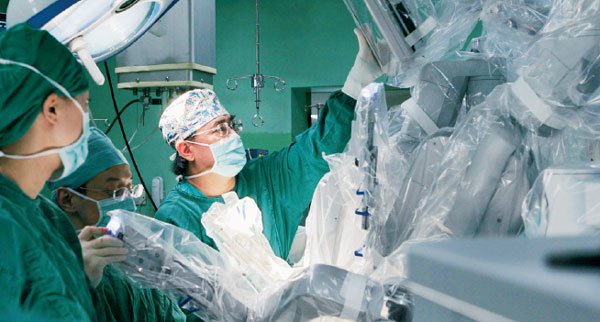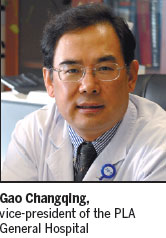Gao Changqing and his team members are adjusting the Da Vinci Surgical System before the operation. Provided to China Daily

Medical team recognized as one of world's best
Invented in the United States more than a decade ago, robotic surgery has since reached new levels of competence in China.
"We are one of the top teams leading the world in the field of robotic cardiac surgery," said Professor Gao Changqing, a cardiac surgeon and vice-president of the PLA General Hospital, where he leads the Cardiac Robotic Surgery Center.
In Da Vinci surgery, computerized technology allows a surgeon to manipulate laparoscopic instruments attached to robotic arms while viewing the procedure in three dimensions, just as if it were open surgery.
Gao said the precision allowed by the robotic surgery is beyond the skill of human hands and the surgical field can be magnified tenfold.
"The technology could help advance medical science and, in the field of Da Vinci surgery, the new tool helps further advance human competence in surgery" he said.
Since 2001, Da Vinci robot surgery has been used in the US mostly in urology and gynecology. It began to be used for some cardiovascular surgery in 2003.
After several field studies and surveys in the US, Gao's hospital introduced a Da Vinci Surgical System, the first in China, in December 2006.

Having first performed trials on more than 50 pig hearts and cadavers, Gao performed China's first heart surgery with the Da Vinci Surgical System on Jan 15, 2007.
"The Da Vinci robot is a surgical tool. What kind of surgical procedure a surgeon can perform depends on the surgeon's own surgical experience," Gao said.
China's first robotic surgery was a cardiac procedure, a surgical area with the highest complexity. That procedure, to repair a mitral valve, was a success.
Since then, "We have been trying to further expand the uses of the robotic surgery," he said.
Many cardiac procedures were performed by Gao using the Da Vinci Surgical System for the first time in the world. These have been published and recognized in world-renowned journals.
The center is now capable of performing 24 different cardiac procedures using the system, more than any other heart center in the world.
Gao and his team have completed more than 700 Da Vinci heart surgeries.
"It's our great surgical team at the Center that made us what we are today," he said.
Before doing Da Vinci surgery, Gao was already a highly competent open-heart surgeon who had performed more than 4,000 such operations.
A patient surnamed Su, 45, said, "I was amazed I could get out of bed and walk the second day after my surgery."
He suffered from an interventricular septal defect, which conventionally requires open heart surgery. However, at Gao's center, the robotic surgery he underwent last week left just three small holes of less than 1 cm in diameter.
"It was wise for me to choose Professor Gao and robotic surgery as I'm recovering so fast," Su said.
Influenced by Gao and his team, 20 more Da Vinci Surgical Systems have been installed nationwide and extended to other surgical areas such as gynecology and urology.
To regulate the highly demanding surgical practice, Gao was nominated by the national health authorities to set and introduce robotic surgical standards and guidelines, and to train competent surgeons. In addition, Gao's center has been authorized to train and certify surgeons from all over the world.
To date, more than 60 surgeons from different countries and regions have trained at the Center.
Walter Randolph Chitwood, Jr, director of the East Carolina Heart Institute at East Carolina University in the US, spoke highly of Gao's surgical team.
"Gao's practice at the hospital has really become a landmark in China and the center of the development of robotic surgery in the nation," he said.
Gao has been honored with board membership in several of the world's leading surgical academic organizations, including the Minimally Invasive Robotic Association, the International Society for Minimally Invasive Cardiothoracic Surgery and the Society of Robotic Surgery. He has also been made a member of the American Association for Thoracic Surgery, the Society of Thoracic Surgeons and the European Association for Cardiothoracic Surgery.
On January 22, 2014, Gao was elected a Member of The French National Academy of Surgery.
shanjuan@chinadaily.com.cn
